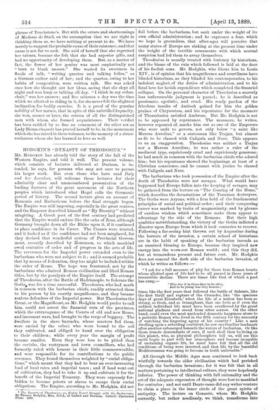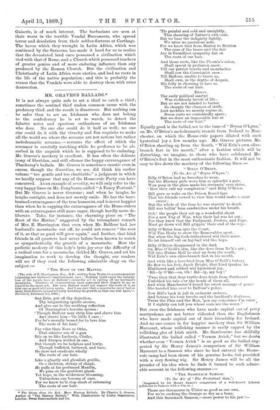HODGKIN'S "DYNASTY OF THEODOSIITS."* Ma. HODGKIN has already told the
story of the fall of the Western Empire, and told it well. The present volume, which consists of lectures delivered at Durham, is in- tended, he says, for persons who may not care to peruse his larger work. But even those who have read Italy and her Invaders, will welcome these lectures for their admirably clear and unencumbered presentation of the leading features of the great movement of the Northern peoples which introduced what Hegel calls the Germanic period of history. The second lecture gives an account of Romania and Barbaricum before the final struggle began. The Empire was still imposing, especially in the great centres, and the Emperor described himself as " My Eternity" without misgiving. A Greek poet of the first century had predicted that the Empire would endure like the oaks of Zeus, although Germany brought down all the Rhine upon it, if it continued to place confidence in its Cmsar. The Caesars were trusted, and it looked as if the confidence had not been misplaced, for they devised that wonderful system of Provincial Govern- ment, recently described by Mommsen, to which mankind owed centuries of order and of progress in the arts of life. The reverence for the Imperial power extended even to the barbarians who were not subject to it ; and it seemed probable that by means of federation, they too might be included within the order of Rome. The hope was frustrated, not by the barbarians who admired Roman civilisation and liked Roman titles, but by the paralysis of the Empire itself. The attempt of Theodosius, after the Battle of Hadrianople, to federate the Goths, was for a time successful. Theodosius, who had much in common with the barbarian chiefs, readily attracted them to his person by his courtly magnificence, and they became zealous defenders of the Imperial power. But Theodosius the Great, or the Magnificent, as Mr. Hodgkin would prefer to call him, could not arrest the financial ruin of the provinces, which the extravagance of the Courts of old and new Rome, and incessant wars, had brought to the verge of beggary. The dwellers in the slave barracks, whose masters fed them, were envied by the eoloni, who were bound to the soil they cultivated, and obliged to hand over the obligation to their children; while every year the margin of profit became smaller. Even they were less to be pitied than the euriales, the vestrymen and town councillors, who had formerly ruled with honour in their little commonwealths, and were responsible for its contributions to the public revenues. They found themselves weighted by " curial obliga- tions," which meant that they had to bear an ever-increasing load of local rates and imperial taxes ; and if land went out of cultivation, they had to take it up and cultivate it for the benefit of the Imperial Treasury,. They were expressly for- bidden to become priests or slaves to escape their curial obligations. The Empire, according to Mr. Hodgkin, did not • The Dynast y of Theodosius ; or, Eighty Years' Struggle 'pith tho Barbarians. ByPress.Th 1889omas Hodgkin, Hon. D.C.L. of Oxford and Durham. Oxford : Clarendon fall before the barbarians, but sank under the weight of its own official administration; and he expresses a fear, which we hope is groundless, that after-ages will perceive that many states of Europe are sinking at the present time under the weight of the terrible armaments with which mutual suspicion had led them to array themselves.
Theodosius is usually treated with leniency by historians, and the blame of the ruin which followed is laid at the door of his foolish sons. Mr. Hodgkin, who likens him to Louis XIV., is of opinion that his magnificence and courtliness have blinded historians, as they blinded his contemporaries, to his indolent neglect of the duties of administration, and to his fatal love for lavish expenditure which completed the financial collapse. On the personal character of Theodosius a scarcely less unfavourable judgment is passed ; he is described as passionate, egotistic, and cruel. His ready pardon of the frivolous insults of Antioch gained for him the golden praises of Chrysostom, and his repentance for the massacre of Thessalonica satisfied Ambrose. But Mr. Hodgkin is not to be appeased by repentance. The massacre, he writes, however repented of, marks him out as one of the Emperors who were unfit to govern, not only below " a saint like Marcus Aurelius," or a statesman like Trajan, but almost as fit to be classed with Caligula and Nero. This appears to us an exaggeration. Theodosius was neither a Trajan nor a Marcus Aurelius; he was rather a ruler of the mediaeval type, capriciously cruel and capriciously generous ; he had much in common with the barbarian chiefs who adored him ; but his repentance showed the beginnings at least of a Christian conscience, and he cannot with justice be classed with Caligula and Nero.
The barbarians who took possession of the Empire after the death of Theodosius were not savages. What would have happened had Europe fallen into the keeping of savages, may be gathered from the lecture on " The Coming of the Huns," which describes the devastations of the Turanian destroyers. The Goths were Aryans, with a firm hold of the fundamental principles of social and political order ; and their conquering career was marked by traits of magnanimity, and by gleams of careless wisdom which sometimes make them appear to advantage by the side of the Romans. But their high qualities notwithstanding, the victory of the Goths inflicted a disaster upon Europe from which it took centuries to recover. Following a far-seeing hint thrown out by Augustine during the horrors of the invasion, a certain school of historians are in the habit of speaking of the barbarian inroads as an unmixed blessing to Europe, because they inspired new energy into the worn-out Roman world ; and this they did, but at tremendous present and future cost. Mr. Hodgkin does not conceal the dark side of the barbarian invasion, of which he writes as follows :- " I ask for a full measure of pity for those true Roman hearts whose allotted span of life had to be all passed in these years of irresistible decline. There are times like that of which a poet has sung,— ' Bliss was it in those days to be alive, And to be young was very heaven ; times like the first years that followed the battle of Salamis, like
the first thrill and rapture of the Crusades, like ' the spacious days of great Elizabeth,' when the life of a nation has been so strong, so fresh, and so triumphant, that one feels as if even the saddest individual life must have been overflowed by the great national gladness and saved from utter sorrow. On the other hand, could even the most unclouded domestic happiness atone to a patriotic Roman who lived in the fifth century for the necessity of watching the lingering agony of his country ? Like a man dwelling upon a subsiding continent, he saw one familiar landmark after another submerged beneath the waters of barbarism. Or like those remote descendants of ours, if such shall then be living on this planet, who, as physical philosophers tell us, will see this earth begin to part with her atmosphere and become incapable of sustaining organic life, he must have felt that all the old conditions of being were inverted, and that life by the beautiful Mediterranean was going to become in truth unliveable."
All through the Middle Ages men continued to look back wistfully towards the older civilisation which had perished through the barbarian invasions ; for it was felt that in all matters pertaining to intellectual culture, they were hopelessly inferior. The power of thinking with full rationality and the art of the adequate expression of thought were lost to mankind for centuries ; and not until Dante came did any writer venture to claim a place in the inner circle of the great spirits of antiquity. The lecture on Genseric, whom Mr. Hodgkin correctly, but rather needlessly, we think, transforms into
Gaiseric, is of much interest. The barbarians are seen at their worst in the terrible Vandal Buccaneers, who spread terror and desolation from their robber-fortress at Carthage. The havoc which they wrought in Latin Africa, which was continued by the Saracens, has made it hard for us to realise that the devastated land once possessed a civilisation which vied with that of Rome, and a Church which possessed teachers of greater genius and of more enduring influence than any produced by the Roman Church. But the civilisation and Christianity of Latin Africa were exotics, and had no roots in the life of the native population ; and this is probably the reason that the Vandals were able to destroy them with utter destruction.



































 Previous page
Previous page